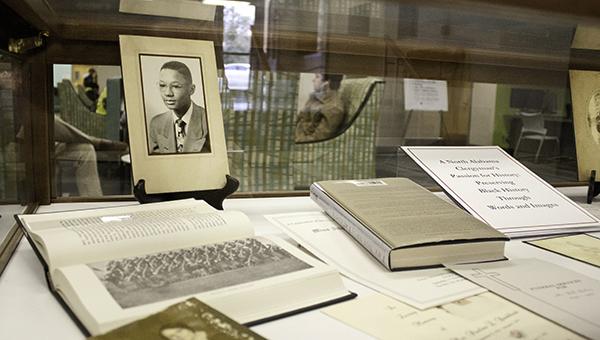Reverend Wylheme H. Ragland and his son, Frederick Kennedy, said they’re aiming to reconstruct a more realistic understanding of the significant contributions of people of color in Alabama through the exhibit, which displays cookbooks, scrapbooks, letters, photographs, wills, journals and funeral bulletins, primarily from north Alabama.
“I think it’s absolutely vital to have different [tools] tell a story, and we want to have things that take the story out of the textbook,” Kennedy said. “If you can hold the diary of a Jubilee Singer, [a touring group of Fisk University in Nashville, Tennessee], that was written 80 years ago as she performed across the world, it really helps shape your perspective.”
Kennedy, who acts as an associate curator for the collection, said he often looks for dates of significance to enhance the meaning the collection’s exhibits.
“The most recent donation of lot of African American content in February [was instigated] by it being Black History Month,” he said. “We thought adding to the collection would make the [celebration] more real. Having things other than the landmark [Martin Luther King Jr.] and Malcolm X, such as a book of memoirs from the 1800s, sparks new interest and makes more of an impact.”
Ragland said the month-long celebration serves as a platform for his campaign to expose the full societal contributions of black Americans.
“Many people are unaware that there were black men in the 116th infantry of Decatur who served as Union soldiers,” he said. “Many of us knew that, but it wasn’t in the books, so ‘it didn’t happen.’”
Ragland said he hopes this history of omission will be countered by the collection, which aims to educate others about a more realistic view of the state’s history.
“We said, ‘Let’s look at the diversity and richness of black history in Alabama,’” he said. “Our collection says there weren’t [just slaves or poor], there were free blacks in Civil War times, [and throughout history] there were educated, middle class citizens who owned businesses and were elected to public office.”
With this exhibit, the Ragland collection has seen three installments at the University’s libraries. Ragland first found his way to UA’s library system via an article on sweet potato pies written by a former staff member of Hoole Special Collections Library.
“I called the library and said, ‘I love the article. My mother made some of the best pies in the United States and was an avid collector of cook books,’” he said. “I told them that I would love to meet with them and donate those, and that was the beginning of a great relationship.”
Although Ragland is an alumnus of Jacksonville State, Emory and Vanderbilt, he said he chose to work with the University based on positive past experiences.
“In our meetings with the staff, we felt this was [the place] to have our ancestors’ wish of preserving this information fulfilled,” he said. “We feel ecstatic with what the library staff is doing. They are professional, kind, energetic; I can’t say enough good things.”
While the Schaudies-Banks-Ragland Collection is a vast one, Ragland said he hopes for it to grow through other families donating their own inherited histories to the special collections library, which will be the eventual beneficiary of the collection. But most of all, Ragland said he hopes to build a new understanding of Alabama’s rich cultural past by taking “an appreciative, truthful, and celebratory look at our history.” The current exhibit in the Pearson Foyer will be on display through March 13.









